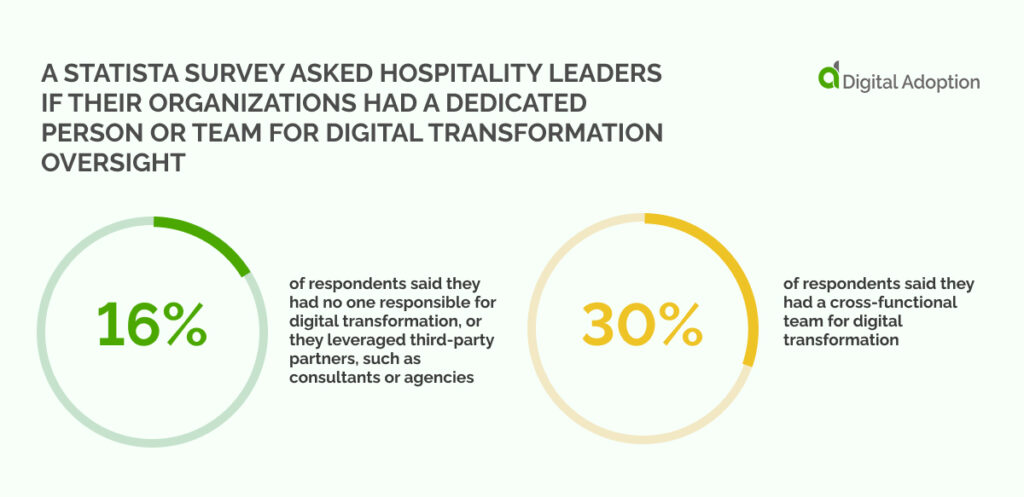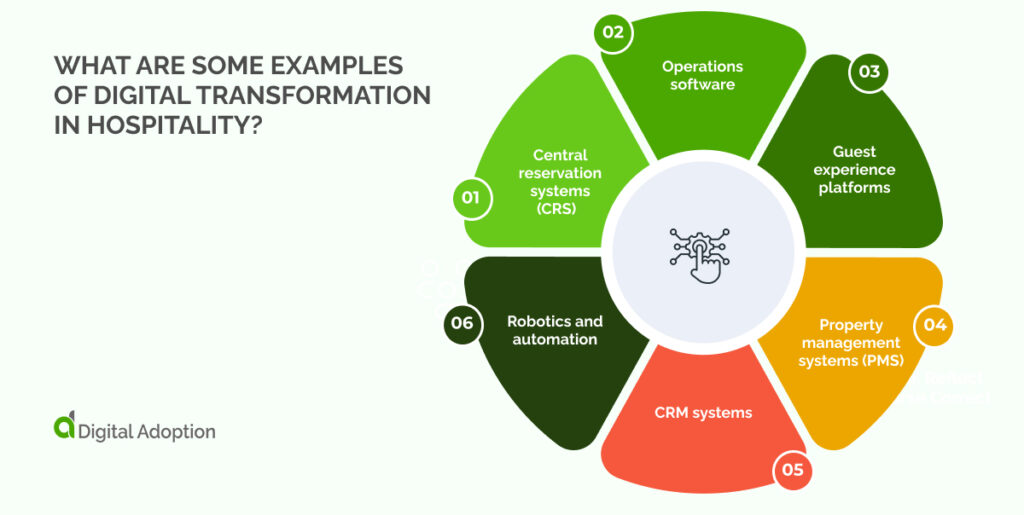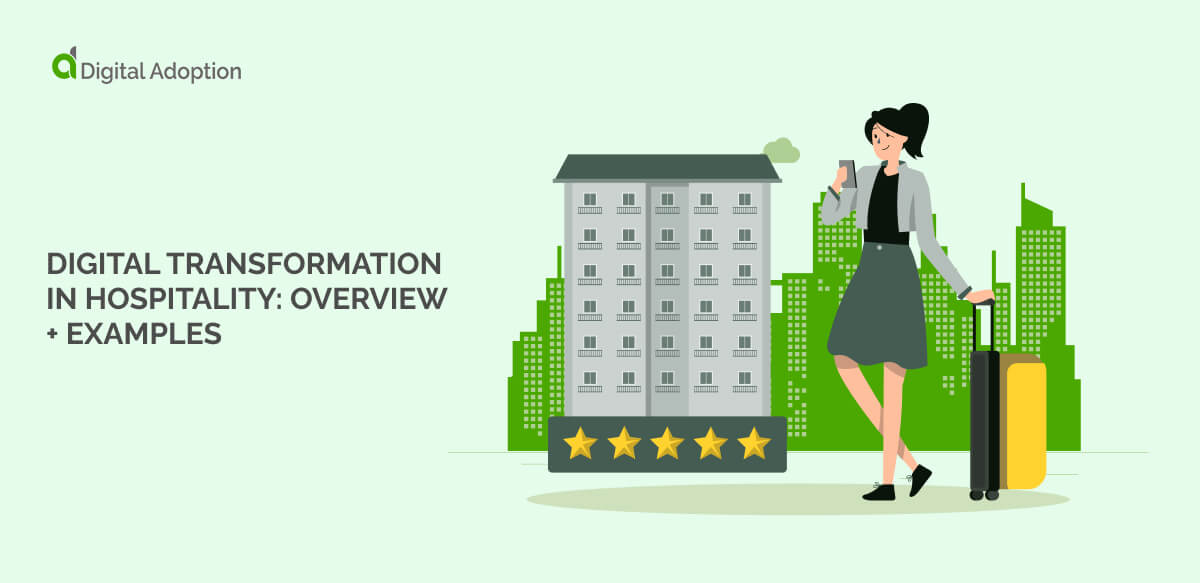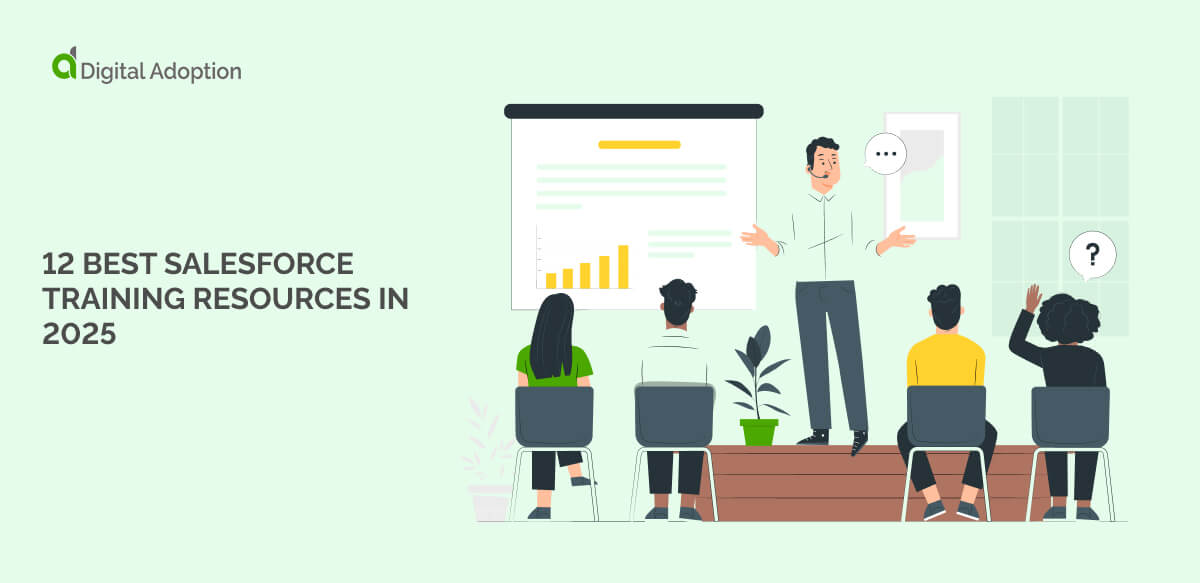Evolving standards across the hospitality industry are always geared towards creating seamless experiences.
These evolving standards encompass customer-facing responsibilities, such as meeting guests’ needs. They also involve back-end processes that ensure facility functions operate smoothly.
Heightened guest expectations and feverish competition are fuelling innovation in the hospitality sector. Fortunately, motivations to continuously improve and create new value make digital transformations in hospitality even more exciting.
Transformations in hospitality are seeing hotel chains embrace new technologies and strategies. This greatly enhances guest experiences and operational resilience.
The potential of evolving hospitality standards is clear. AI-driven customer portals can handle inquiries 24/7, and convenient mobile check-ins allow guests to bypass the front desk. This frees up employees to handle other tasks.
This article explores the world of modern digital transformation in hospitality. We’ll start with a clear definition and explore its impact on the industry. Then, we’ll delve into its key objectives and bring it to life with real-world examples.
- What is digital transformation in hospitality?
- What is the impact of digital transformation in hospitality?
- What are some examples of digital transformation in hospitality?
- What are the benefits of digital transformation in hospitality?
- What are the challenges of digital transformation in hospitality?
- Digital fluidity: A hospitality must-have
What is digital transformation in hospitality?
The hospitality industry is undergoing a digital transformation. This involves implementing technology to modernize customer experiences and internal processes.
The scope of digital transformation in hospitality extends to all aspects of the business. These changes are geared toward driving positive impacts for guests, employees, and stakeholders.
Hospitality leaders are embracing innovative digital solutions that deliver operational excellence. This reimagines customer care, simplifies property management, and handles service functionalities within an intuitive technology ecosystem.
These transformations extend beyond short-sighted technology investments. They focus on holistic changes in which technology is one part of the puzzle. The ability to adapt is key to future success.
No matter the type of transformation, organizations with a high capacity for change will thrive. Those who struggle to adapt will likely fall behind.
SMART systems can even enable precise room control, allowing guests to manage temperature and lighting exactly to their preference. IoT networks can monitor property facilities, ensuring smooth operation and potential identification of any issues.
What is the impact of digital transformation in hospitality?

Readily available digital solutions give the hospitality sector numerous ways to improve operations.
However, this industry is vast and diverse. The hospitality industry includes hotels, theme parks, restaurants, bars, and leisure/tourism operators. It even extends to other service sector entities.
Hospitality businesses meet an array of customer needs. This variety means digital transformations will differ from business to business. Understanding each establishment’s unique pain points and considerations requires tailored strategies to succeed.
Digital transformation strategies can vary. One establishment might leverage AI models to automate simple administrative tasks, or it could use AI to glean predictive insights from guest preferences.
Other strategies exist beyond AI. Deploying user-friendly mobile apps can fast-track guest requests. Social media engagement is another option that helps drum up brand interest online.
Statista launched a global survey to assess hotel guests’ preferences for contactless options during their stay. The results showed that 73% of respondents preferred using an app to open their room doors.
What are some examples of digital transformation in hospitality?

The hospitality industry is undergoing a significant digital transformation. This means hotels and other businesses are embracing new technologies to improve everything from booking a room to controlling its lights.
Let’s explore some of the top technologies impacting transformations in the hospitality industry:
Operations software
Digital transformation in hospitality hinges on a core element: solid operations software.
These solutions streamline workflows by consolidating various management systems. With a user-friendly interface, service professionals can effectively manage multiple tasks.
These systems handle reservations, housekeeping, guest billing, scheduling, and maintenance. The specific needs of each hospitality organization mean choosing different operations software solutions.
Some solutions will need to scale alongside the dynamic nature of some businesses. Others will offer more specialized functionalities. Customizable modules even allow hotels to create custom dashboards to manage core activities.
Real-time updates guarantee staff are well-informed. This often leads to better service and quicker response times. This flexibility ensures the software can evolve with the business while addressing operational demands.
Guest experience platforms
Guest experience platforms are software solutions designed to supercharge each visitor’s stay.
These platforms have become a cornerstone for hoteliers. They empower staff to orchestrate a seamless and elevated guest journey. They are essential tools for streamlining guest operations.
These platforms offer various features that enhance the guest experience. Features like online reservation systems and mobile check-in allow frictionless booking and arrival processes.
Dedicated guest apps function as a centralized hub, providing guests 360-degree control over their stay. Through these apps, guests can personalize their experience. They can adjust room settings, request amenities, or schedule spa services directly from their phones.
Easily accessible chat portals facilitate effortless two-way communication. This promotes a more connected experience for guests. Ultimately, these platforms empower guests to voice their feedback. They generate valuable data that hoteliers can leverage to continuously improve their offerings.
Property management systems (PMS)
Property management systems (PMS) are the cornerstone of efficient hotel operations.
These software platforms manage everything from reservations to billing and payment processing. They help ensure smooth workflows and minimize errors.
Advanced PMS solutions go beyond core functionalities by integrating with other systems. These include channel managers and revenue management tools to create a unified environment. They also offer insightful data analysis and reporting. This empowers hotels to optimize pricing strategies, marketing efforts, and resource allocation.
A well-implemented PMS is a strategic investment that contributes to a hotel’s profitability. This technology streamlines operations and enhances guest experiences through features like self-service check-in. It also provides valuable data for informed decision-making.
CRM systems
Customer relationship management (CRM) systems have become a cornerstone for cultivating strong guest relationships within the hospitality industry.
These software platforms function as a centralized data repository. They meticulously store guest information from past stays. This data encompasses a broad spectrum of details. It usually includes booking preferences, special requests, and post-stay feedback.
Personalized service becomes the core principle of the guest experience. Staff become empowered to anticipate guest needs and tailor offerings accordingly.
This data-driven approach fosters deeper guest loyalty and a sense of being valued as a customer. CRM systems further elevate hotel operations by automating targeted marketing campaigns. These systems move beyond generic promotions. They allow hotels to craft personalized offers directly resonating with guests’ past experiences.
The tangible outcome of effective CRM utilization is a measurable increase in guest satisfaction. This translates to a higher likelihood of repeat business—a key performance indicator for any successful hotel.
Robotics and automation
Hotels are embracing a new era of automation with the help of robots.
These tireless mechanical assistants are taking center stage. They are being strategically deployed to manage a multitude of tasks within hotels.
Guest rooms are a prime example. Robots handle cleaning duties and ensure consistent hygiene standards, freeing up housekeeping staff for more personalized guest interactions.
This shift streamlines operations and minimizes the potential for human error. Robots are even starting to tackle room service delivery. They guarantee prompt and efficient service while allowing staff to focus on other guests’ needs.
The impact of robotics extends beyond immediate benefits. Hotels that embrace this technology position themselves as innovative leaders. They cater to a growing segment of tech-savvy travelers who value a modern, frictionless experience.
Effective robotics integration elevates guest satisfaction and creates a competitive advantage in hospitality.
Central reservation systems (CRS)
In the hospitality industry, central reservation systems (CRS) are critical in optimizing room distribution and revenue generation.
These software platforms connect hotels with online travel agencies (OTAs). This connectivity ensures real-time updates on room inventory across various booking channels.
CRS technology enables hotels to reach a wider audience of potential guests, maximizing occupancy rates and driving revenue growth.
CRS also integrates with property management systems (PMS). This integration eliminates the risk of overbooking by ensuring real-time synchronization of room availability and rates across all platforms.
CRS empowers hotels with effective rate management capabilities. Hotels can even establish and adjust pricing strategies across various channels based on market demand, optimizing profitability.
What are the benefits of digital transformation in hospitality?
The hospitality industry is experiencing a significant shift driven by technological advancements.
Digital transformation offers many advantages for hotels, resorts, and other hospitality businesses. It allows them to optimize operations, enhance guest experiences, and gain a competitive edge.
Here are some of the most crucial benefits:
Enhanced operational efficiency
Digital solutions can streamline and automate manual tasks. They can free up staff for higher-value interactions with guests.
Property management systems, automation tools, and guest self-service options offer a powerful combination. They can reduce administrative burdens by streamlining reservations, check-in/check-out, and housekeeping management.
This translates to cost savings and improved resource allocation. It also allows hotels to handle increased guest volume effectively.
Personalized guest experiences
Digital technologies empower hospitality businesses to deliver a personalized experience for each guest. Hotels can tailor offerings and services to individual preferences by leveraging data analytics.
Guest profiles can be built based on past stays and booking patterns. This allows staff to anticipate and proactively address needs.
Mobile apps provide guests with control over room settings, contactless ordering, and real-time communication with staff. This instills a sense of convenience and control throughout their stay.
Data-driven decision making
Digital transformation promotes a data-centric approach to hospitality management.
Business intelligence platforms and analytics tools provide valuable insights into guest behavior. They also analyze market trends and operational performance.
These insights empower hotels to make informed decisions about pricing strategies and revenue management. Resource allocation and marketing campaigns also benefit.
Data visualization tools can translate complex data sets into clear, actionable insights. This enables hoteliers to optimize operations and maximize profitability.
Omnichannel marketing and guest engagement
Today’s guests expect a seamless experience across all touchpoints.
Digital transformation facilitates the development of an omnichannel marketing strategy. Hotels can reach potential guests through various online platforms and social media channels.
Personalized marketing campaigns can be tailored to specific guest segments. This maximizes engagement and drives conversions.
Digital tools also facilitate real-time communication with guests before, during, and after their stay. This helps hotels build stronger relationships and expand brand loyalty.
Competitive advantage and future-proofing
Facing fierce competition from OTAs and alternative lodging, hotels must digitally transform to stay relevant.
Today’s tech-savvy travelers expect a seamless experience. Digital tools deliver this through mobile check-in, keyless entry, and in-room personalization. Data analysis fuels targeted marketing and dynamic pricing while back-office operations become more efficient.
Staff also benefit from improved communication and training tools. Digital transformation isn’t a fad; it’s the key to long-term success. It allows hotels to adapt to changing preferences and embrace future innovations like AI chatbots and VR tours.
What are the challenges of digital transformation in hospitality?
The hospitality industry is embracing digital transformation to enhance guest experiences and optimize operations.
However, this journey presents several hurdles that require careful consideration.
Here are some of the challenges that stand out:
Financial investment and integration complexity
Securing the financial resources for new digital solutions is a major challenge.
Hospitality businesses need to monitor costs closely. This includes analyzing hardware, software, and employee training expenses. By doing so, they can ensure a positive return on investment for their digital transformation efforts. Exploring cost-saving strategies like cloud-based solutions and phased implementation plans is crucial.
Integrating various digital platforms can also be complex. They demand expertise to ensure seamless data flow across disparate systems.
Careful planning and monitoring are crucial to reap the full benefits of digital transformation. These steps help avoid operational disruptions and data silos that can hinder progress.
Navigating data security and privacy
Another challenge involves navigating the evolving world of data security and governance.
The hospitality industry handles a vast amount of sensitive guest data. This often includes personal information, financial details, and travel preferences.
Digital transformation in hospitality hinges on robust cybersecurity. Guest information is a valuable target for cyberattacks, data breaches, and unauthorized access. To safeguard this data, businesses must prioritize implementing strong security measures, including firewalls, data encryption, and employee security awareness training.
Furthermore, compliance with evolving data privacy regulations requires ongoing vigilance and adaptation.
Transparency is key for hospitality businesses. They must be clear about how they collect guest data and offer easy opt-in and opt-out options. Businesses also need established protocols for data deletion upon guest request. This helps ensure control over personal information.
Employee buy-in and bridging the skills gap
Successfully navigating digital transformation also hinges on employee buy-in and addressing the skills gap.
A shift in organizational culture and employee skillsets is often necessary. Businesses need to develop effective change management strategies to address resistance.
Promoting a culture of openness is crucial for a smooth digital transformation. This includes open communication and transparent leadership. Employee participation is equally important. Providing opportunities for employees to be involved in the process can lead to a more successful outcome.
Upskilling and reskilling ensure employees have the skills to operate new digital platforms and deliver an exceptional guest experience.
Ensuring guest adoption
Ensuring guest adoption and technological accessibility presents another challenge.
While digital solutions offer convenience, not all guests are comfortable with technology. Hospitality businesses must strike a balance. They need to leverage automation for efficiency and provide traditional service options for guests who value a personal touch.
Maximizing guest adoption of these new technologies hinges on user experience. Clear instructions and user-friendly interfaces are essential.
This may involve offering multi-lingual support or providing printed instructions alongside digital options. It also includes training staff to assist guests with unfamiliar technologies.
Catering to diverse guest preferences ensures a smooth transition. It maximizes the benefits of digital transformation for both guests and the business.
Demonstrating the value proposition
Demonstrating the value proposition of digital transformation requires measuring the return on investment for these initiatives.
Quantifying the ROI can be challenging. Businesses can overcome this hurdle by establishing clear goals and measurable metrics. These metrics should assess the impact of new technologies on key performance indicators (KPIs). These include guest satisfaction scores, operational efficiency metrics, and revenue generation figures.
A data-driven approach that tracks key metrics and analyzes the impact of new technologies is essential. This approach demonstrates the value proposition of digital transformation and secures continued investment.
Hotels considering these challenges and developing a comprehensive strategy can navigate the digital transformation journey and reap the benefits.
Digital fluidity: A hospitality must-have
Today’s Hotels and hospitality businesses must prioritize a sustained commitment to technological innovation.
A successful digital transformation strategy goes beyond just acquiring the newest tech.
Hospitality businesses need to shift to implementing solutions that elevate the guest experience. Think voice-activated room controls for added convenience. Or immersive virtual reality tours that allow potential guests to explore the property before booking. These are examples of how technology can really enhance the guest experience.
Empowering staff through targeted training programs equips them to leverage technology for personalized service.
An informed concierge adept at utilizing guest data can provide tailored recommendations. One’s that transcend generic brochures, cultivating deeper guest relationships.
The hospitality industry’s digital transformation is an ongoing process, not a one-time event.
Hotels can stay ahead of the curve by nurturing experimentation and partnering with agile technology providers. This approach ensures their offerings remain relevant and responsive to evolving guest needs.
The hospitality industry is constantly evolving. To thrive in this dynamic environment, hotels must embrace continuous technological advancements. This will be key to securing reservations and exceeding guest expectations.




![13 AI Examples in Industry [2025]](https://www.digital-adoption.com/wp-content/uploads/2025/07/AI-Examples-in-Industry-300x146.jpg)






![13 AI Examples in Industry [2025]](https://www.digital-adoption.com/wp-content/uploads/2025/07/AI-Examples-in-Industry.jpg)

